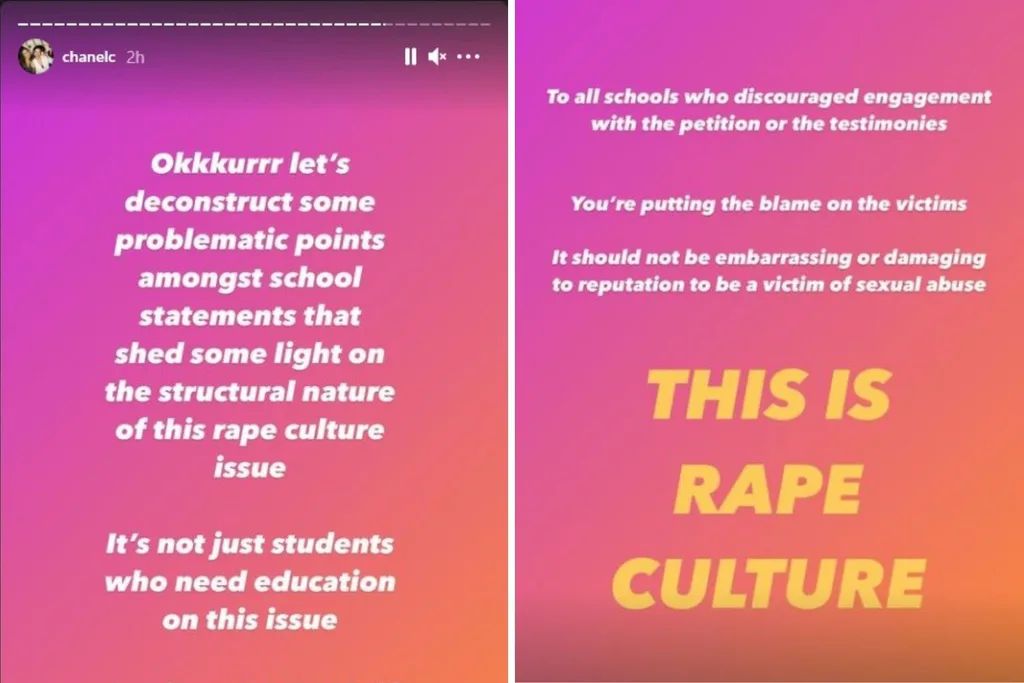Chanel Contos has called out the response from some Sydney private schools around her campaign for earlier and more comprehensive sexual education, labelling their statements as defensive, hypocritical and perpetuating victim blaming.
“They’ve just done it for the media. A lot of these schools have released these statements and there’s maybe a sneaky little victim blame in there somewhere or they’re being defensive about it,” Contos, 22, told marie claire over the phone from the UK where she’s completing her masters in gender and education at the University College of London. “This isn’t an argument about whether we get adequate sex education or not. We do not. There’s no argument here.”
Last Thursday Contos, a former student of Sydney private school Kambala, launched a petition calling on schools to incorporate a “sexual consent education” much earlier in their curriculum. The petition, which was originally reported by the Sydney Morning Herald, also calls for a more “holistic” approach to sex ed, suggesting it address topics such as consent, rape culture, slut shaming, toxic masculinity and queer sex education.
In the four days since, Contos has received over 3,000 testimonies of sexual assault from current and former schoolgirls from across Australia, some claiming they were raped by boys from all-boys private schools, some when they were as young as 13.
Currently, the petition has more than 19,000 signatories.
Multiple schools have since made statements asserting their commitment to addressing the problem and reiterating that they have programs in place to teach consent.
Despite this, Contos feels some still aren’t getting the message, with many of their statements, she believes, inherently victim blaming and deflecting the issue. Some schools are allegedly discouraging students from sharing their testimonies at all. “I’ve heard multiple accounts from students at all girls schools in Sydney saying that the schools are asking them not to submit testimonies because it’ll create a bad reputation,” Contos tells us.
“It is the essence of victim blaming to say it’s a damage to our reputation to have been sexually assaulted. I don’t think schools realise that they’re perpetuating rape culture by doing that, by thinking that it’s something to be ashamed of.”

Contos believes generational differences in understanding concepts like consent and rape culture are resulting in some school executives not grasping the message. “It’s going to be so hard to tackle because we’re not just educating students; we have to educate a whole generation of people who have a patriarchal mindset ingrained in them,” she notes. “We need to flip their world upside down by making them aware of the fact we live in a rape culture. Every time they tell their daughter not to wear something provocative, that’s perpetuating rape culture, that’s putting the onus on girls.
“Those girls probably had a sense of empowerment over the weekend, feeling like they could speak up, only to go into school the next day, your institution of learning where things mean so much to you, and to be told not to do that? It just proves that the mark is being missed and it just proves that these media statements are for the media.”
She also believes it’s hypocritical of all-girls’ institutions, which champion empowerment for their students, to encourage silence at a time like this. “If the students aren’t even educated enough to know they’ve been sexually abused or to know how societal pressures – like toxic masculinity – might put them in a situation where they could be sexually abused, then these schools aren’t empowering anyone. It’s just so hypocritical,” she says.
“The hypocrisy in what we preach is astounding. Like, they raise money to send to girls’ schools in low-income countries to empower those girls when they’re not even empowering the girls in front of them.”
In spite of the disappointing initial response, Contos says she’s been in touch with schools such as Kambala, who have agreed to let her hold a seminar for teachers on rape culture and victim blaming as well as get her involved in developing content to address structural issues contributing to an unsafe environment.
Going forward, Contos has plans to launch a website and hopes continued pressure as well as a more collaborative effort between schools, policy makers and experts will result in a better educational and cultural outcome. “I want to speak to as many principles as I can, I want to speak to as many MPS as I can,” she says. “I’m also assembling a team of pro bono professionals who can guide me through this and give me advice. It’s gotten to a point where I can’t tackle this alone, we need as much support as we can possibly get.”










